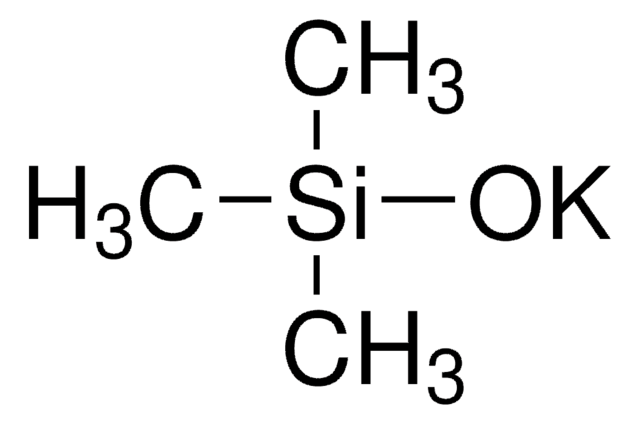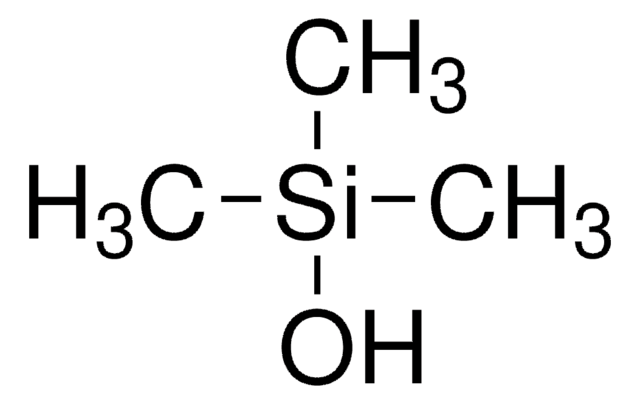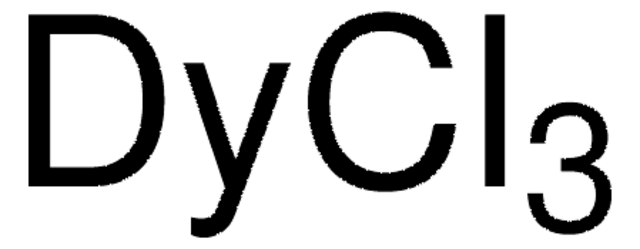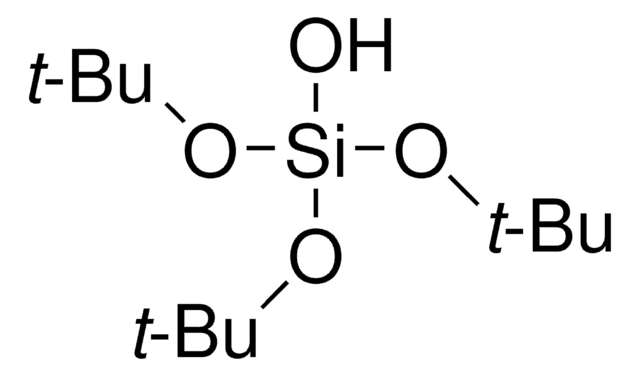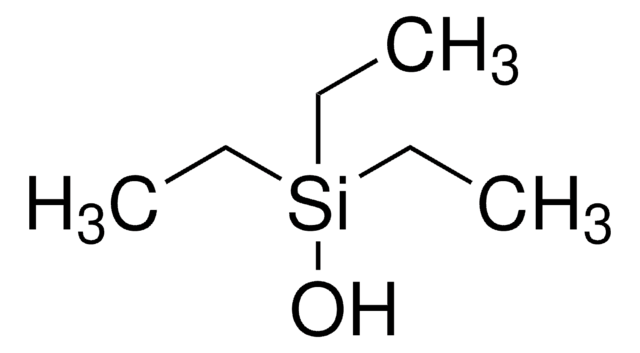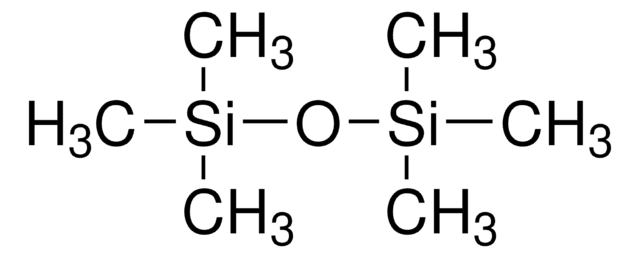Wszystkie zdjęcia(2)
Kluczowe dokumenty
345474
Lithium trimethylsilanolate
95%
Synonim(y):
Trimethylsilanol lithium salt
Zaloguj sięWyświetlanie cen organizacyjnych i kontraktowych
About This Item
Wzór liniowy:
(CH3)3SiOLi
Numer CAS:
Masa cząsteczkowa:
96.13
Beilstein:
3686900
Numer MDL:
Kod UNSPSC:
12352000
Identyfikator substancji w PubChem:
NACRES:
NA.22
Polecane produkty
Próba
95%
Formularz
solid
ciąg SMILES
[Li+].C[Si](C)(C)[O-]
InChI
1S/C3H9OSi.Li/c1-5(2,3)4;/h1-3H3;/q-1;+1
Klucz InChI
OXOZHAWWRPCVGL-UHFFFAOYSA-N
Szukasz podobnych produktów? Odwiedź Przewodnik dotyczący porównywania produktów
Powiązane kategorie
Zastosowanie
- Ulepszona kontrola procesu i składu osadzania warstw atomowych za pomocą trimetylosilanolanu litu: Niniejsze badanie dotyczy nowego prekursora litu, trimetylosilanolanu litu (LiTMSO), do osadzania warstw atomowych, porównując go z innymi prekursorami litu w celu poprawy procesu i kontroli składu (Ruud et al., 2017).
- Kompleksy metali na bazie trimetylosiloksylowej jako dodatki do elektrolitów do zastosowań wysokonapięciowych w ogniwach litowo-jonowych: W artykule omówiono syntezę trimetylosilanolanu litu i jego zastosowanie jako dodatku zwiększającego wydajność wysokonapięciowych ogniw litowo-jonowych (Imholt et al., 2017).
- Zastosowanie soli alkalicznych trimetylosilanolanu w syntezie organicznej: Przegląd ten obejmuje różne zastosowania trimetylosilanolanu litu w syntezie organicznej, podkreślając jego rolę w różnych reakcjach (Bürglová i Hlaváč, 2018).
Ta strona może zawierać tekst przetłumaczony maszynowo.
Hasło ostrzegawcze
Danger
Zwroty wskazujące rodzaj zagrożenia
Zwroty wskazujące środki ostrożności
Klasyfikacja zagrożeń
Eye Dam. 1 - Skin Corr. 1B
Kod klasy składowania
8A - Combustible corrosive hazardous materials
Klasa zagrożenia wodnego (WGK)
WGK 3
Środki ochrony indywidualnej
Eyeshields, Faceshields, Gloves, type P3 (EN 143) respirator cartridges
Wybierz jedną z najnowszych wersji:
Masz już ten produkt?
Dokumenty związane z niedawno zakupionymi produktami zostały zamieszczone w Bibliotece dokumentów.
Klienci oglądali również te produkty
D M Hui et al.
Clinica chimica acta; international journal of clinical chemistry, 302(1-2), 171-188 (2000-11-14)
We developed a new assay method for fluoride anion (F(-)) a specific metabolite of sarin. Trimethyifluorosilane (TMFS) was derivatized from F(-) with trimethylsilanol, and TMFS was detected with a GC-flame ionization detector (FID) and capillary column system. The linear range
A Isquith et al.
Food and chemical toxicology : an international journal published for the British Industrial Biological Research Association, 26(3), 263-266 (1988-03-01)
Six organosilicon compounds which had been found to have clastogenic activity in an in vitro battery of genotoxicity assays were evaluated in rat bone marrow cytogenetic assays for assessing clastogenicity in an in vivo system. None of the six compounds
Igor S Ignatyev et al.
Spectrochimica acta. Part A, Molecular and biomolecular spectroscopy, 60(5), 1169-1178 (2004-04-16)
The assignment of the SiOH group vibrations of trimethylsilanol, which is still controversial, is proposed. This assignment is based on theoretical B3LYP force field scaled using the constants of the (CH3)3Si group optimized to fit experimental vibrational frequencies of (CH3)3SiF
Fabricio A Hansel et al.
Rapid communications in mass spectrometry : RCM, 25(13), 1893-1898 (2011-06-04)
A methodology is presented for the determination of dihydroxy fatty acids preserved in the 'bound' phase of organic residues preserved in archaeological potsherds. The method comprises saponification, esterification, silica gel column chromatographic fractionation, and analysis by gas chromatography/mass spectrometry. The
Diane M Coe et al.
Organic & biomolecular chemistry, 1(7), 1106-1111 (2003-08-21)
A convenient and efficient method for the cleavage of 1,3-oxazolidin-5-ones and 1,3-oxazolidin-2-ones utilising potassium trimethylsilanolate in tetrahydrofuran is described. The benzyloxycarbonyl-protecting group is readily removed under the reaction conditions, whereas the N-benzoyl group is stable. A synthesis of (R)-salmeterol exploiting
Nasz zespół naukowców ma doświadczenie we wszystkich obszarach badań, w tym w naukach przyrodniczych, materiałoznawstwie, syntezie chemicznej, chromatografii, analityce i wielu innych dziedzinach.
Skontaktuj się z zespołem ds. pomocy technicznej
